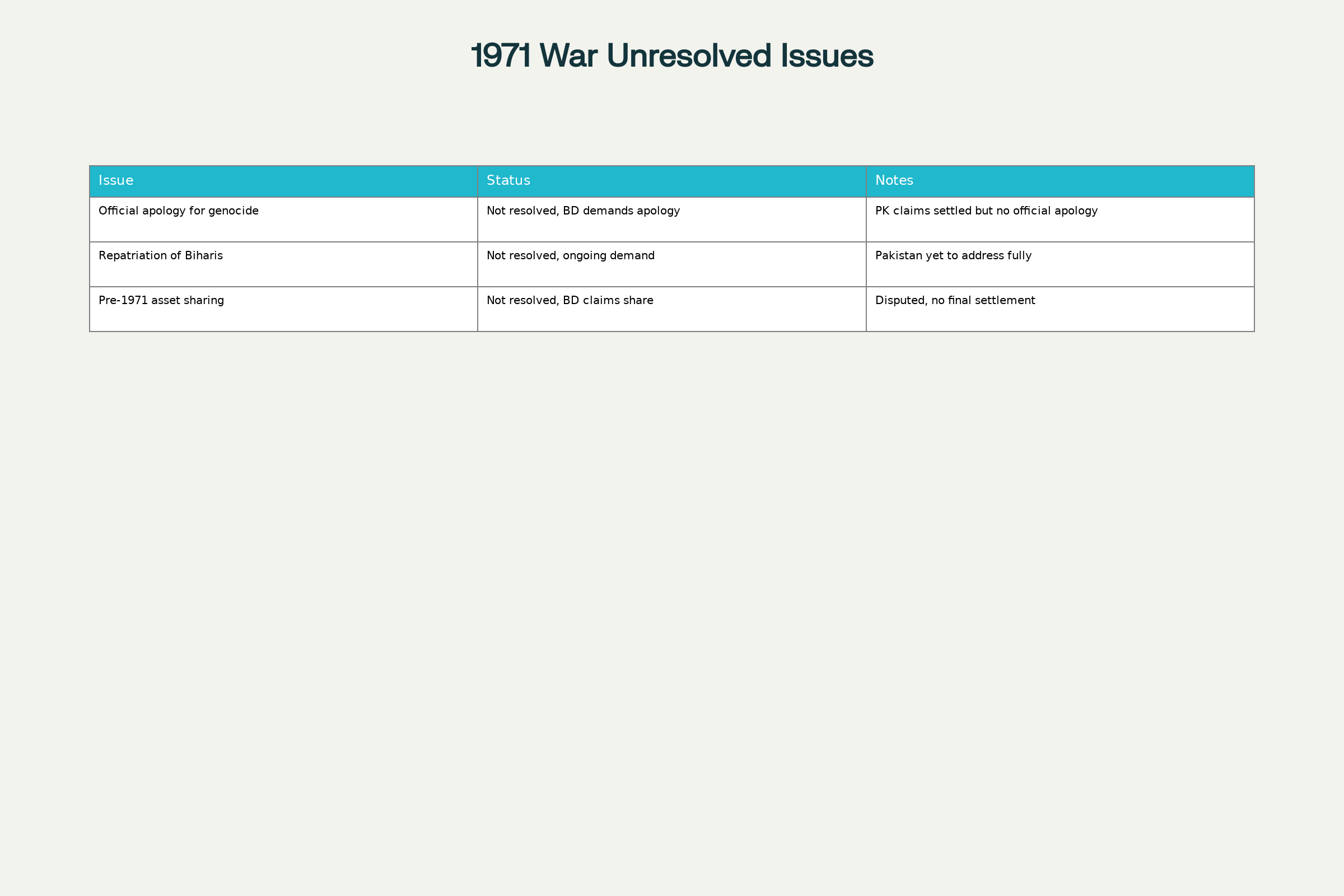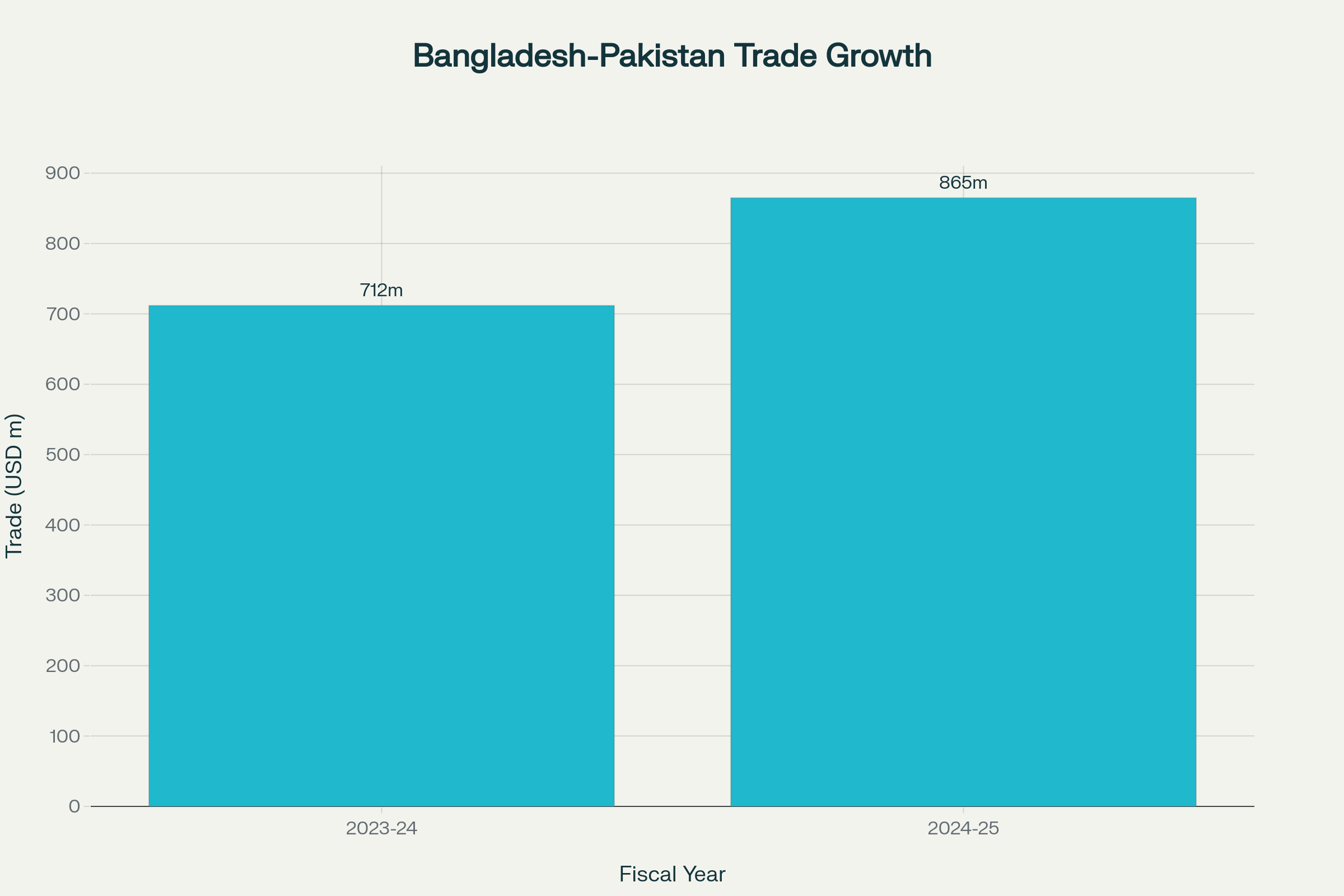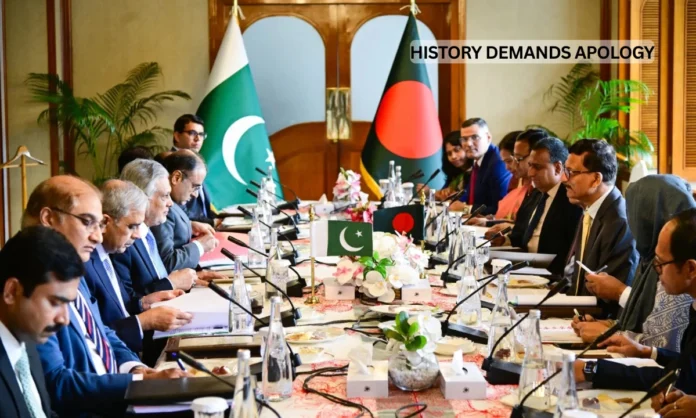Key Highlights
- Bangladesh Foreign Adviser M Touhid Hossain firmly rejected Pakistan Foreign Minister Ishaq Dar’s claims about resolving the Bangladesh reject Pakistan minister’s 1971 war issues
- Three core unresolved issues persist: formal genocide apology, repatriation of stranded Pakistanis, and pre-independence asset distribution
- Despite historical disputes, both nations signed six cooperation agreements with bilateral trade reaching $865 million in 2024-25
Opening Overview
A significant diplomatic confrontation emerged between Bangladesh and Pakistan as their foreign ministers clashed over the Bangladesh reject Pakistan minister’s 1971 war issues during crucial bilateral talks in Dhaka. Foreign Adviser M Touhid Hossain categorically disputed Pakistan Foreign Minister Ishaq Dar’s assertion that contentious 1971 war issues had been comprehensively resolved through previous agreements, marking a substantial setback in otherwise improving diplomatic relations between the South Asian neighbors.
The dispute centers on Pakistan’s continued refusal to acknowledge key demands regarding the Bangladesh reject Pakistan minister’s 1971 war issues, including formal apology for genocide, repatriation of stranded populations, and resolution of pre-independence financial claims. This diplomatic disagreement occurred during Dar’s historic visit to Dhaka, the first by a Pakistani foreign minister since 2012, highlighting persistent challenges in addressing historical grievances while rebuilding bilateral ties.
Deputy Prime Minister and Foreign Minister, Senator Mohammad Ishaq Dar @MIshaqDar50, held wide-ranging talks with the Foreign Adviser of Bangladesh, H.E. Md. Touhid Hossain in Dhaka. Both sides reviewed entire gamut of bilateral relations, including high level exchanges , trade… pic.twitter.com/nqELdHhbjU
— Ministry of Foreign Affairs – Pakistan (@ForeignOfficePk) August 24, 2025
The confrontation underscores complex dynamics where the Bangladesh reject Pakistan minister’s 1971 war issues position reflects deeper structural issues, as economic cooperation flourishes with bilateral trade reaching $865 million in fiscal 2024-25, even while fundamental historical disputes remain unresolved. The timing proves particularly significant as both countries seek strengthened relations following Bangladesh’s political transition after Sheikh Hasina’s ouster in August 2024.
Diplomatic Standoff Reveals Fundamental Disagreements
The Bangladesh reject Pakistan minister’s 1971 war issues stance emerged clearly during bilateral negotiations at Dhaka’s Pan Pacific Sonargaon, where both sides presented conflicting interpretations of historical agreements. Foreign Adviser Hossain stated unequivocally that he disagreed with Dar’s position, emphasizing that fundamental issues remained unaddressed despite Pakistan’s claims.
- Pakistan referenced the 1974 Tripartite Agreement and former President Pervez Musharraf’s early 2000s statements as evidence of complete resolution
- Bangladesh maintains no official apology has been issued for 1971 genocide and widespread atrocities committed by Pakistani forces
The Bangladesh reject Pakistan minister’s 1971 war issues position reflects deeper concerns about the 1974 agreement’s limitations. While Pakistan views this document as comprehensive resolution, Bangladesh argues it left crucial accountability measures unaddressed. The agreement released 195 senior Pakistani officers accused of war crimes based on verbal assurances of domestic justice that were never honored.
Pakistan’s conditional statement condemning crimes “that may have been committed” fell short of acknowledging documented atrocities, creating space for denial and rehabilitation of those responsible. This fundamental disconnect explains why the Bangladesh reject Pakistan minister’s 1971 war issues approach insists on explicit acknowledgment rather than procedural references to past agreements.
The diplomatic impasse demonstrates how different interpretations of historical documents continue influencing contemporary relations, where Pakistan’s approach of claiming settlement conflicts directly with Bangladesh’s demand for genuine accountability and formal recognition of wartime injustices.
Core Unresolved Issues Define Current Negotiations

Unresolved 1971 War Issues Between Bangladesh and Pakistan
The Bangladesh reject Pakistan minister’s 1971 war issues position centers on three fundamental demands that remain unaddressed despite Pakistan’s historical settlement claims. During negotiations, Foreign Adviser Hossain explicitly outlined specific requirements that transcend rhetorical acknowledgments, demanding concrete actions and formal commitments.
- Bangladesh seeks official apology and expression of regret for 1971 genocide and systematic atrocities committed by Pakistani military forces
- Repatriation of stranded Pakistanis, commonly referred to as “Biharis,” represents a humanitarian crisis requiring comprehensive resolution mechanisms
Pre-independence financial settlement involves Bangladesh’s rightful claim to assets from unified Pakistan, representing complex economic calculations spanning over five decades. These demands reflect consistent positions maintained across different Bangladeshi governments, indicating non-partisan nature of these historical grievances that transcend political transitions.
The Bangladesh reject Pakistan minister’s 1971 war issues approach emphasizes that Pakistan’s responses have consistently referenced past agreements without addressing specific contemporary demands. Pakistani delegation’s strategy of citing historical precedents rather than engaging with current requirements creates fundamental disconnects in diplomatic understanding.
The persistence of these unresolved issues demonstrates how historical injustices continue shaping contemporary diplomatic relations, requiring substantive engagement rather than procedural agreements to achieve genuine reconciliation. The Bangladesh reject Pakistan minister’s 1971 war issues stance reflects broader principles of accountability and justice that extend beyond bilateral considerations.
Economic Cooperation Advances Despite Historical Tensions

Bangladesh-Pakistan Bilateral Trade Growth (Million USD)
Despite disagreements over the Bangladesh reject Pakistan minister’s 1971 war issues, both countries demonstrated remarkable progress in economic and bilateral cooperation during the talks. Six significant agreements were signed covering trade, education, media, and cultural cooperation, institutionalizing collaboration across multiple sectors while historical disputes persisted.
- Bilateral trade increased 27% to $865 million in fiscal 2024-25, compared to approximately $712 million in the previous fiscal year
- Visa exemption agreement for diplomatic and official passport holders facilitates smoother governmental exchanges and business cooperation
The Pakistan-Bangladesh Knowledge Corridor initiative represents substantial educational investment, offering 500 scholarships to Bangladeshi students over five years, with 25% specifically allocated for medical studies and training programs for 100 civil servants. This cooperation demonstrates commitment to human resource development despite the Bangladesh reject Pakistan minister’s 1971 war issues disagreement.
Trade discussions focused on enhanced access to Pakistani markets under South Asian Free Trade Area (SAFTA) framework, particularly benefiting textiles, energy, pharmaceuticals, agriculture, fisheries, livestock, and information technology sectors. Pakistan expressed interest in energy exports to Bangladesh, highlighting complementary economic opportunities.
The establishment of joint working groups institutionalizes ongoing commercial dialogue, while cooperation agreements between foreign service academies create foundations for sustained engagement. These initiatives prove that the Bangladesh reject Pakistan minister’s 1971 war issues dispute need not prevent practical cooperation, generating positive momentum for expanded bilateral relations.
Regional Implications Shape Diplomatic Calculations
The Bangladesh reject Pakistan minister’s 1971 war issues controversy occurs within shifting regional dynamics that influence bilateral relations and broader South Asian cooperation frameworks. This diplomatic engagement follows Bangladesh’s political transition and Muhammad Yunus’s interim government installation, representing significant recalibration of regional relationships and strategic alignments.
- Warming Bangladesh-Pakistan ties coincide with cooling Dhaka-New Delhi relations, creating new regional diplomatic equations that affect strategic calculations
- Both countries committed to reviving South Asian Association for Regional Cooperation (SAARC) and addressing regional challenges including Palestine and Rohingya crises
Bangladesh’s “Bangladesh-centric” foreign policy approach prioritizes national interests and reciprocity in international relations, creating opportunities for enhanced cooperation previously constrained by regional alignments. The Bangladesh reject Pakistan minister’s 1971 war issues position reflects this independent diplomatic approach that transcends traditional regional partnerships.
Direct sea trade resumed in November 2024 after over half a century, demonstrating practical benefits of improved relations despite historical disagreements. Military contacts have resumed with discussions on joint exercises and training, indicating deepening cooperation across governance sectors while the Bangladesh reject Pakistan minister’s 1971 war issues debate continues.
Security sensitivities persist regarding potential defense cooperation that might concern regional neighbors, particularly given evolving strategic partnerships. The complex interplay of historical grievances, contemporary economic opportunities, and shifting regional dynamics continues shaping Bangladesh-Pakistan relations in ways extending beyond bilateral considerations influenced by the Bangladesh reject Pakistan minister’s 1971 war issues discourse.
Final Perspective
The Bangladesh reject Pakistan minister’s 1971 war issues controversy reveals persistent challenges in addressing historical injustices while pursuing contemporary cooperation between these South Asian neighbors. Despite Foreign Minister Dar’s claims of historical resolution, Bangladesh’s firm rejection demonstrates that meaningful reconciliation requires genuine acknowledgment of documented atrocities rather than procedural references to outdated agreements that fail to address core accountability issues.
The parallel success of economic cooperation, evidenced by $865 million bilateral trade and six new cooperation agreements, suggests practical collaboration can coexist with unresolved historical disputes. However, the sustainability of this approach depends on Pakistan’s willingness to engage seriously with Bangladesh’s legitimate demands for formal apology, comprehensive asset settlement, and humanitarian resolution regarding stranded populations affected by the Bangladesh reject Pakistan minister’s 1971 war issues impasse.
The broader regional implications extend beyond bilateral relations, influencing South Asian stability and multilateral cooperation frameworks. As both nations navigate complex intersections of historical grievances and contemporary opportunities, resolution of the Bangladesh reject Pakistan minister’s 1971 war issues dispute remains crucial for achieving full partnership potential in the evolving geopolitical landscape where historical accountability and future cooperation must find sustainable balance.


